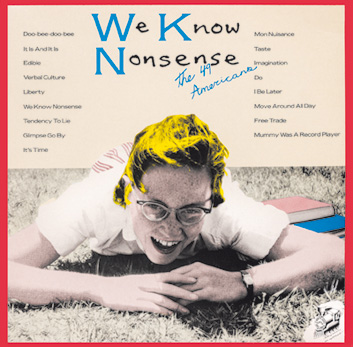 The 49 Americans were a collision of proficient, working musicians and enthusiastic amateurs, one of many projects in the often improvised history of the London Musicians Collective. The inspired, thoughtful, jaunty tunefulness of We Know Nonsense is partly inspired by Julie Andrews.
The 49 Americans were a collision of proficient, working musicians and enthusiastic amateurs, one of many projects in the often improvised history of the London Musicians Collective. The inspired, thoughtful, jaunty tunefulness of We Know Nonsense is partly inspired by Julie Andrews.
The 49 Americans had so many members that several of them never actually met the others. Such was the project’s commitment to democracy that at early concerts no one was allowed to play the same instrument from one song to the next. This meant songs took considerably less time to perform than instrument switching breaks between songs, with members consulting various charts and checklists.
The group formed at the behest of Andrew Brenner, aka "Giblet," who writes or co-writes most of the pieces on this beautiful reissue. As a teenager moving from the US to London in the late 1970s he discovered the DIY ethos where "three chords made a band, photocopying made a fanzine and putting a cassette tape onto a plastic disc made a record label." The first expression of Giblet’s creativity was to form the band Buddy Hernia and the Rickets, fusing teenage-rock parody with a gleeful celebration of inability. That sounds absolutely dreadful, but The 49 Americans were rather magnificent and would come come to make We Know Nonsense, which is included in Wire magazine’s "100 records that set the world on fire (while no one was listening)."
Giblet drew other members in as he pushed the ethos of collectivity, liberty, participation, and the notion that "Happy music doesn’t have to be dumb." The Rickets were invited to an evening watching tapes of Mary Poppins and The Sound of Music after which they created the track "Julie Andrews" for The 49 Americans’ 14 track debut single (the longest single possible - a triumph of quantity). Two unsuccessful London buskers were recruited and, at a seaside festival in Brighton, Giblet made the acquaintance of Lol Coxhill (soprano & vocals), Steve Beresford (euphonium), Peter Cusack (guitar), Paul Burwell (drums), Terry Day (cello) and Max Eastley and David Toop (african one-string fiddle) aka The Promenaders- all of whom would play in The 49 Americans, along with Viv Goldman and Viv Albertine of The Slits and many others. The names are unimportant, though, as this was to be as ego-free as possible with all involved engaged in "an experiment in the pursuit of happiness."
The discovery of the London Musicians Collective was a further catalyst, since membership meant use of a free performance space, a huge old railway building in Camden. Variant magazine has a history of the LMC told in the words of those who were in it, such people as Burwell, Ed Baxter, one of The Frank Chickens, David Toop, and far too many others to mention. What emerges is the spirit of the place with factions, hopeless membership meetings, exuberant workshops designed to "de-emphasize the soloist," or achieve collective music by "atomising" sound before reforming it into layers: all of this somehow being the grit from which pearls could sometimes be made. There were Aeolian harps tied onto the roof, revolving glass coffee tables played with chunks of polystyrene, the floor flooded to create the Mississippi river, evenings devoted to Inuit culture and so on.
Attending the LMC, as non-or relatively inept musicians meant some conflict with the original free-jazz guys who had first used the place, but also a welcome and patient collaboration between those highly proficient and adventurous musicians who saw value in sharing energy and ideas with newcomers. It also meant having to nip next door to a film collective’s place to use the bathroom - since toilets were not included in the LMC space.
From the outside, if anyone else was aware of its existence, presumably the political Left might have mistakenly thought this communal space would encourage staunch protest and deep sincerity, while the Right could have incorrectly assumed that it was a hotbed of political correctness where alternate versions of nursery rhymes deemed offensive were being incubated, along with the the occasional paeon to the entire rainbow of sexualty. Against this backdrop, and that of the early years of Thatcherism, it is deeply satisfying to imagine The 49 Americans, primed by an evening watching the full-on antics of the Von Trapp Family or Dick van Dyke, launching into their tunes, for no better reason than their own enjoyment and just for the very doing of it.
This CD version of We Know Nonsense comes with 23 bonus tracks from their debut LP and EP across a range of styles: bossa nova, African tin-whistle, doo wop, scratchy punk-funk, and more. The songs mainly concentrate on clear and thoughtful vocals, however, which allows them to almost float above influence and genre. The singing is flat at times but always has a quizzical charm. The title track, along with "Liberty," "It's Time," and the wonderful "I Be Later," are exuberant, crafty, humble and joyous recordings. A greater proportion of the more proficient musicians were used for We Know Nonsense, as the group decided they wanted it to be their best possible effort. This is cheerful yet erudite music, a free and easy mix of philosophy and polite exclamation with an overriding sense of democratic participation and a strong insistence upon its inherent lack of importance.
The history and legacy of the London Musicians Collective is also the topic of Get a Haircut And Disappear, a radio documentary by Nick Hamilton with a broad range of music and interviews with Clive Bell, David Toop, Paul Burwell, Ed Baxter and others. It was originally broadcast on Resonance.FM, a station which to a great extent revels in the adventurous spirit and welcoming ethos of the Colllective.
Read More

